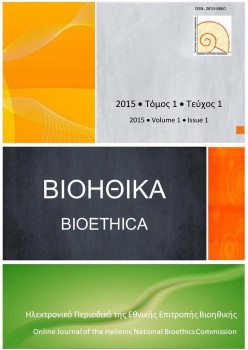Ορίζοντας την υγεία και την ασθένεια: Η αυτογνωσία ως κριτήριο υγείας
Resumen
Ένα κεντρικό ζήτημα στην φιλοσοφία της ιατρικής επιστήμης είναι να επιλυθεί το πρόβλημα ορισμού των εννοιών της υγείας και της ασθένειας. Κάποιοι ισχυρίζονται ότι η υγεία και η ασθένεια είναι αξιακά ουδέτερες και περιγραφικές έννοιες, οι οποίες ανακαλύπτονται και θεμελιώνονται στις βιολογικές και ιατρικές επιστήμες. Άλλοι, υποστηρίζουν ότι η υγεία και η ασθένεια είναι αξιακά φορτισμένες έννοιες, δηλ. οι υγιείς καταστάσεις είναι αυτές που επιθυμούμε ή αξιολογούμε θετικά, ενώ οι καταστάσεις νόσου είναι αυτές που απαξιώνουμε και θέλουμε να αποφύγουμε.
Λαμβάνοντας υπόψη την μακροχρόνια διαφωνία μεταξύ των θεωρητικών της υγείας, των ιατρών και των φιλοσόφων σχετικά με τα βασικά χαρακτηριστικά της υγείας και της ασθένειας, ο στόχος του πρώτου μέρους της παρούσας εργασίας είναι να παρουσιαστούν συνοπτικά τέσσερις φιλοσοφικές προσεγγίσεις της υγείας και της ασθένειας, ώστε να εισαγάγουν τον αναγνώστη στην συζήτηση. Το άρθρο ξεκινά με τη Βιοστατιστική θεωρία του Christopher Boorse. Στην συνέχεια ακολουθεί η θεωρία “Malady“ των Danner Clouser, Charles Culver & Bernard Gert, η ολιστική θεωρία του Lennart Nordenfelt και τέλος η θεωρία προσαρμογής του József Kovács.
Στο δεύτερο μέρος της εργασίας παρατίθενται μερικές ενστάσεις για κάθε θεωρία. Στο τρίτο και τελευταίο μέρος, παρουσιάζεται μια τελείως διαφορετική προσέγγιση υγείας, σύμφωνα με την οποία, η ικανότητα αυτογνωσίας είναι κριτήριο υγείας. Το συμπέρασμα της εργασίας είναι ότι η υγεία, σε αντίθεση με την ασθένεια, δεν είναι μια κατάσταση του οργανισμού, αλλά μια ατέρμονη διαδικασία του ατόμου. Η ουσία της μπορεί να συλληφθεί καλύτερα με φιλοσοφικούς παρά με ιατρικούς όρους και ισχύει μόνο για ανθρώπινα όντα.
Article Details
- Cómo citar
-
Αθανασιάδης (Grigoris Athanasiadis) Γ. (2015). Ορίζοντας την υγεία και την ασθένεια: Η αυτογνωσία ως κριτήριο υγείας. Bioethica, 1(1), 4–24. https://doi.org/10.12681/bioeth.19784
- Sección
- Original Articles
Authors who publish with this journal agree to the following terms:
- Authors retain copyright and grant the journal right of first publication with the work simultaneously licensed under a Creative Commons Attribution CC BY 4.0 License, which allows for immediate free access to the work and permits any user to read, download, copy, distribute, print, search, or link to the full texts of articles, crawl them for indexing, pass them as data to software, or use them for any other lawful purpose. Appropriate credit must be given by citing the author(s) and the original publication in this journal.
- Authors are able to enter into separate, additional contractual arrangements for the non-exclusive distribution of the journal's published version of the work (e.g. post it to an institutional repository or publish it in a book), with an acknowledgement of its initial publication in this journal.
We encourage authors to deposit their articles, as well as data underlying the publications, in institutional and/or other appropriate subject repositories.
Bioethica permits and encourages authors to archive the final publication pdf in institutional (e.g. the repository of the National Hellenic Research Foundation) or other appropriate subject repositories (e.g. SSOAR repository for social sciences), in compliance with institutional and/or funder open access policies, after publication in the BIOETHICA. Authors must provide bibliographic details that credit publication in the journal, as well as related funding details (when applicable).
Lists of institutional and other subject-based academic open access repositories can be found listed by country at the registry http://opendoar.org/countrylist.php
If your institution does not possess a repository you may deposit a copy of your paper at no cost with www.zenodo.org , the repository supported for open access research in the EU by the European Commission, through the project OpenAIRE (www.openaire.eu )



